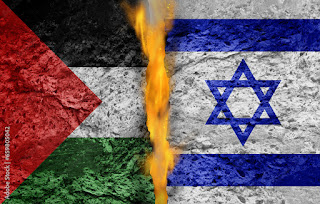Historical
Context:
The
involvement of the United States in the Israeli-Palestinian conflict can be
traced back to the post-World War II era, with the establishment of the state
of Israel in 1948. Since then, the U.S. has maintained a close relationship
with Israel, largely due to historical, cultural, and strategic reasons. This
bond between the U.S. and Israel has been reinforced by shared democratic
values, military cooperation, and economic ties.
The U.S. was
the first country to recognize Israel as a state and has consistently supported
its right to exist and defend itself. Over the years, the U.S. has provided
significant financial aid and military assistance to Israel, which has
contributed to Israel's military capabilities and security infrastructure. This
support has played a pivotal role in shaping the power dynamics within the
region.
U.S.
Mediation Efforts:
Throughout
the conflict, the United States has made numerous attempts to mediate peace
negotiations between Israel and the Palestinians. These efforts have taken
various forms, including direct diplomacy, hosting peace talks, and sponsoring
agreements aimed at resolving the long-standing disputes. Notable attempts
include the Camp David Accords in 1978, the Oslo Accords in the 1990s, and the
more recent efforts by different U.S. administrations to broker peace deals.
The Oslo
Accords, signed in the 1990s with U.S. mediation, were a significant milestone
in the peace process. However, the failure to fully implement these accords and
subsequent outbreaks of violence, including the Second Intifada, underscored
the complexity and challenges in achieving a lasting peace agreement.
Shifts in
U.S. Policies:
U.S. policy
towards the Israeli-Palestinian conflict has seen fluctuations and shifts
depending on different administrations and geopolitical circumstances. While
the U.S. has traditionally supported Israel, the approach of each
administration has varied. Some administrations have opted for a more active
role in pushing for peace negotiations, while others have taken a more
hands-off approach, emphasizing the importance of direct negotiations between
the parties involved.
Under the
Trump administration, a significant shift in policy was witnessed with the
unveiling of the "Deal of the Century" peace plan, which aimed to
resolve the conflict by proposing a detailed framework for a two-state
solution. The plan, however, was met with mixed reactions, with Palestinians
rejecting it outright, citing concerns about its bias towards Israel.
The Biden
administration, which succeeded the Trump era, has reiterated its support for a
two-state solution and has taken steps to restore diplomatic ties and financial
aid to the Palestinians, aiming to foster dialogue and rebuild trust among the
involved parties.
Impact of
U.S. Intervention:
The U.S.
intervention in the Israeli-Palestinian conflict has had a profound impact on
the region. Its unwavering support for Israel has been a point of contention,
with critics arguing that such support has emboldened Israel in its policies,
including settlement expansions in the West Bank, which are considered illegal
under international law.
Moreover, the
U.S.'s role in the peace process has at times been met with skepticism from
Palestinians and other regional actors. Critics have argued that the U.S.
cannot be an entirely neutral mediator due to its strong ties with Israel,
leading to questions about the fairness and effectiveness of U.S.-led
negotiations.
Additionally,
U.S. aid to the region, primarily to Israel, has been a subject of debate.
While it has undoubtedly bolstered Israel's defense capabilities, critics have
raised concerns about the use of American aid in ways that perpetuate the
conflict, potentially undermining prospects for peace.
Challenges
and the Way Forward:
The
Israeli-Palestinian conflict remains a deeply entrenched and intricate issue.
Achieving a sustainable resolution is complex and requires a multi-faceted
approach that considers the aspirations and grievances of both Israelis and
Palestinians.
Moving forward, a comprehensive peace settlement demands
commitment from all parties involved, including the U.S. as a pivotal player.
To be an effective mediator, the U.S. will need to navigate the complexities of
the conflict while ensuring a balanced approach that considers the concerns and
aspirations of both sides.
Addressing core issues such as borders, settlements,
security, refugees, and the status of Jerusalem is vital. Moreover, a genuine
commitment to a two-state solution, where both Israelis and Palestinians can
live side by side in peace and security, is essential.
In conclusion, the United States' intervention in the
Israeli-Palestinian conflict has been deeply influential, with a historical
alignment with Israel and numerous attempts at mediating peace. However,
challenges persist, and a lasting solution requires continued efforts,
dialogue, and a commitment from all parties involved, including the United
States, to achieve a just and sustainable resolution to this enduring conflict.








No comments:
Post a Comment